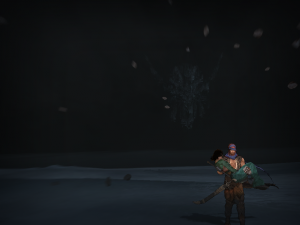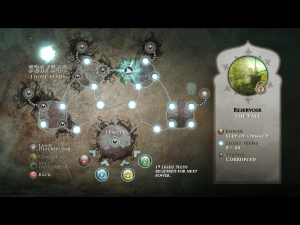Prince of Persia (2008): Tricky Ending
It took me until the ending to realize this, but the story of Prince of Persia (2008) owes quite a bit to Shadow of the Colossus. Oh, it’s less subtle about it, leaves less unsaid, puts the player in a less morally ambiguous role for the bulk of the game. But the two games share a fundamental story of a woman restored from the dead by means of a Faustian bargain with an imprisoned dark god (who speaks in both male and female voices), a bargain that leaves the buyer physically changed, corrupted (or Corrupted), and the darkness empowered. There’s some similarity of setting as well: an isolated and forgotten valley containing ruins of a dead civilization, including the massive central temple where the darkness is housed.
The chief difference is that in SotC, arranging for the woman’s resurrection by doing the bidding of the darkness is the player’s job, whereas in PoP it’s already happened: Elika’s life was the one restored, and her father, the king, was the one desperate enough from grief to listen to Ahriman’s temptations. As a result, he becomes one of the game’s recurring bosses, always waiting for you back at the temple when you have something important to do there. This state of affairs is revealed in full through dialogue about midway through the game, but disjointed visions hint at it throughout. (In fact, the very first thing you see on starting a new game is a disjointed vision, which seems like a very bad choice to me. As I’ve said before with respect to other games, the purpose of a game’s intro is to orient the player, not disorient them.)
The point is that Elika, as beneficiary of the deal, feels responsible for Ahriman’s imminent escape. This is why she’s pushing herself so hard. Also, she belongs dead, and she knows it. In the end, sealing Ahriman away again means sacrificing the life that she got from him. I’m not quite clear on which is cause and which is effect, as it makes sense either way, but they definitely go together. And what follows is one of the most interesting things about the game, or at least one of the artsiest.
Control of the story effectively ends here, but control of the avatar does not. The Prince picks up Elika’s limp corpse from where it lies, at the base of the now-luminous tree growing on the seal of Ahriman’s tomb, and control is given to the player, who pilots the Prince back outside — there being nowhere else to go. You move slowly; you can’t run or jump while carrying the body. At a certain point in the long passageway out, the credits start scrolling by on one side of the screen. This condition lasts long enough for the player to think of this state, of carrying the dead princess out, as an ending.
But of course it’s an ending that has to come to an end, when you emerge from the temple, and lay Elika down on her mother’s tomb, and still have no place to go. There’s no way out of the valley. The areas you spent most of the game exploring are unreachable without Elika’s magic. You can’t even try to kill yourself; all the cliffs are now protected by invisible walls. You can hear Ahriman whispering about how unjust the situation is, that Ormazd (Elika’s god but explicitly not the skeptical Prince’s) used Elika as his pawn and then discarded her. It’s easy to feel a similar sense of betrayal here, if not by a creator deity, then by the creator of the game.
Restoring the temple had caused four withered stumps on top of stone structures outside to grow back into small trees, each bathed in light. Reaching each of these trees required a different jumping trick — here we are after the credits, but there’s still a bit of genuine gameplay left. This left the question of what to do with the trees once I reached them. It turns out that there’s only one thing you can do, only one input recognized: the Sword button, which chops them down and re-corrupts the area around them. And it was clear: I was being given the opportunity to re-make the choice that Elika’s father made. To bring Elika back to life by giving Ahriman what he wants. To render the entire game thus far moot. To imitate Shadow of the Colossus more directly. A moral choice, leading to good and bad endings (or bad and worse, as the case may be)? No, there’s only one ending. I looked for another option, a way to just leave this place, to leave Elika dead and not make things any worse. The only options are to continue the story by destroying the world, or to quit, which is more or less the same thing.
The strange part is that I kind of feel like quitting was a legitimate option here. I don’t usually feel that way: just as shutting a film off before the final reel doesn’t change the film’s ending, so too does a game with a single scripted ending still have that ending even if you refuse to play through it. But, like I said, this game goes out of its way to make you feel like you’ve already seen the ending of the story at this point.  Nonetheless, I played on to the darker conclusion. The last thing you see is the Prince carrying Elika away, groggy but definitely living and not at all pleased, as Ahriman emerges and overtakes them, filling the sky.
Nonetheless, I played on to the darker conclusion. The last thing you see is the Prince carrying Elika away, groggy but definitely living and not at all pleased, as Ahriman emerges and overtakes them, filling the sky.
Apparently a lot of people were unhappy with this ending, and a DLC epilogue was added to the console versions to pacify them. (The epilogue does not seem to be available through Steam.) However, as seems to usually be the case with unpopular endings, I like it. It is, if nothing else, gutsy. It’s not just a cheap shock ending, because it emerges from the characters — including the self-centeredness of the Prince, who proves through his actions here how little he cares about the epic struggle he’s been assisting, or even about Elika’s wishes. Also, it’s kind of a Snake Plissken ending, a way for the hero to assert his autonomy by defying the powers that dared to assume his continuing loyalty even as the reason for that loyalty was taken away. And that’s something you don’t see a lot in games. (You don’t even really see it in the Metal Gear series, which is on record as taking inspiration from Snake Plissken.) Ironic, then, that for the player, it’s the ending you get by just going along with what the game wants you to do.
Viewing it cynically, though, the whole thing was probably meant mainly as a sequel hook, and from that point of view, it was a failure. Just as well. To my mind, it works best as the last word.
 Comments(2)
Comments(2)